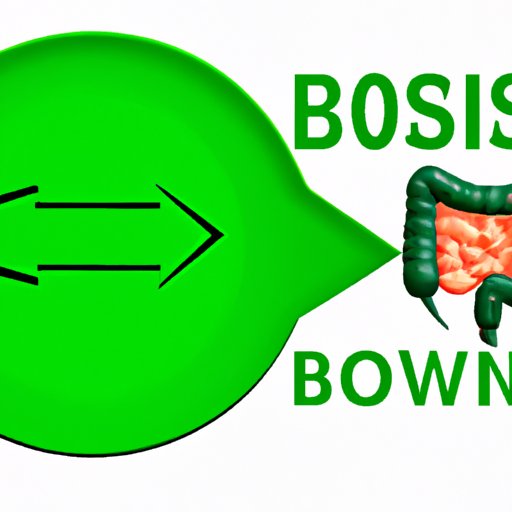
Introduction
Constipation is a common occurrence, affecting nearly 20% of the population. It’s defined as having fewer than three bowel movements per week or experiencing difficulty passing stool. While it’s a temporary inconvenience for many, chronic constipation can lead to serious health issues such as hemorrhoids and anal fissures. In this article, we’ll clarify whether or not it’s possible to still pass feces while experiencing constipation, explain how digestion works, and offer tips for easing the discomfort of constipation.
The Truth About Constipation: Can You Still Poop?
Constipation occurs when the muscles in your digestive system are sluggish or the passage of stool is too slow. The longer it takes for waste to move through your digestive tract, the harder and drier the stool becomes, making it more difficult to pass. While you may feel like you need to have a bowel movement, the stool can sometimes be too large or hard to pass comfortably.
Some people believe that if they’re able to poop, they can’t be constipated. However, this isn’t entirely true. You may experience incomplete bowel movements, which means that you don’t fully empty your bowels. This can lead to discomfort and bloating, as well as the risk of developing hemorrhoids and other complications.
When Constipation Doesn’t Mean an Empty Bowel: A Guide to Understanding Your Digestive System
There are several types of constipation, including slow-transit constipation, pelvic floor dysfunction, and irritable bowel syndrome. Slow-transit constipation occurs when the muscles in your colon don’t contract enough to move food waste through your digestive tract. Pelvic floor dysfunction is when the muscles that help control bowel movements are weakened, making it harder to pass stools. Irritable bowel syndrome, or IBS, is a digestive disorder that can cause abdominal pain, bloating, and constipation.
Several factors can contribute to constipation, including a low-fiber diet, dehydration, lack of exercise, stress, and certain medications. Understanding how your digestive system works can help you identify possible causes of constipation and work to alleviate it.
The Frustrating World of Constipation and Defecation: Exploring the Connection Between the Two
Bowel movements are a natural and essential part of the digestive process. They help rid the body of waste and toxins and keep your digestive system healthy. When you experience constipation, bowel movements may become infrequent, less productive, or difficult to pass. However, even if you’re constipated, you can still have a bowel movement.
The connection between constipation and bowel movements is complex. Your intestines are responsible for absorbing nutrients and fluids from the food you eat, while the colon and rectum store and eliminate waste. When your colon is full, it sends a signal to your brain to empty it. However, if the muscles in your colon are slow or weak, or if the stool is too hard, you may not be able to completely empty your bowels.
Constipation Hacks: How to Ease Your Symptoms and Get Things Moving
If you’re experiencing constipation, there are several lifestyle adjustments, natural remedies, and over-the-counter medications you can try to alleviate your symptoms. Drinking plenty of water, eating fiber-rich foods such as fruits, vegetables, and whole grains, and exercising regularly can all promote healthy bowel movements. Natural remedies like prune juice, psyllium husk, and probiotics can also help ease constipation. Over-the-counter medications like stool softeners, laxatives, and enemas can also be effective, but should be used with caution and under the guidance of a healthcare provider.
Other practical tips to ease constipation include sitting on the toilet for several minutes, taking deep breaths to relax the muscles in your abdomen, and using a stool to elevate your feet while sitting on the toilet. These hacks can help make your bowel movements more comfortable and productive.
The Low-Down on Poop: Why You Can Still Go When Constipated and What It Means
Regular bowel movements are key to maintaining good digestive and overall health. When you’re constipated, the passage of stool may be slow or difficult, but it’s still important to try to have a bowel movement to prevent discomfort and potential complications. If you’re experiencing constipation, you may notice that your stool is harder and drier than usual, which is a sign that more water and fiber may be necessary in your diet.
Constipation can also be a sign of an underlying health condition, such as hypothyroidism, diabetes, or colorectal cancer. If you’re experiencing chronic constipation, or if it’s accompanied by other symptoms such as blood in your stool or persistent abdominal pain, it’s important to speak with your healthcare provider to rule out any serious underlying causes.
The Constipation Conundrum: Getting to the Bottom of Whether or Not You’re Really Blocked Up
If you’re experiencing constipation, dietary changes, exercise, stress management, and other lifestyle modifications can help alleviate your symptoms. It’s also important to address the psychological aspects of constipation, as stress and anxiety can contribute to slowed digestive function. If constipation persists despite these interventions, it may be necessary to seek medical attention to identify underlying causes and develop an individualized treatment plan.
Conclusion
Constipation can be a frustrating and uncomfortable experience, but understanding your digestive system can help ease symptoms and promote healthy bowel movements. While it’s possible to still pass feces when constipated, the passage of stool can be slow and difficult, and may lead to complications if left untreated. By making lifestyle adjustments, trying natural remedies, and seeking medical attention if necessary, constipation can be effectively managed to promote optimal digestive health.





